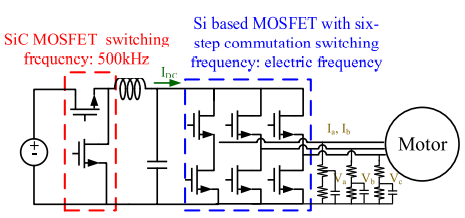Torque Ripple Reduction for BLDC Permanent Magnet Motor Drive Using DC-Link Voltage and Current Modulation
Objective
The main objective of the proposed method is to reduce the torque ripple and improve the performance of the system by using DC-link voltage and current modulation.
Abstract
This paper proposes a torque ripple reduction for brushless DC (BLDC) permanent magnetic (PM) motor drive based on the DC-link voltage pulse amplitude modulation (PAM). The proposed method improves torque ripple drawback for BLDC drives at low speed. BLDC drives have the better inverter efficiency and requires low position sensing resolution. However, both freewheeling current during diode conduction and discontinuous motor phase current cause high torque ripples. In this paper, a front-end DC converter is added to improve BLDC torque ripples. Although the integration of DC converter and BLDC drive has been reported, the DC voltage regulation for the BLDC torque ripple compensation is this paper novelty. On the basis, the DC bus is modulated during diode conduction to manipulate the DC current dynamically every BLDC commutation period. In addition considering the discontinuous six-step commutation, the DC current is also regulated with the 6th-order spatial harmonic to minimize the commutation reflected torque ripple. The proposed torque ripple compensation of BLDC drive is verified by simulation for different PM motor types.
Keywords: Torque ripple, brushless DC motor, and pulse amplitude modulation.
NOTE: Without the concern of our team, please don't submit to the college. This Abstract varies based on student requirements.
Block Diagram

Specifications
Software Configuration:
Operating System : Windows 7/8/10
Application Software : Matlab/Simulink
Hardware Configuration:
RAM : 8 GB
Processor : I3 / I5(Mostly prefer)
Learning Outcomes
- Introduction to Matlab/Simulink
- What is EISPACK & LINPACK
- How to start with MATLAB
- About Matlab language
- About tools & libraries
- Application of Matlab/Simulink
- About Matlab desktop
- Features of Matlab/Simulink
- Basics on Matlab/Simulink
- Introduction to controllers.
- Study of PWM techniques.
- Project Development Skills:
- Problem analyzing skills
- Problem solving skills
- Creativity and imaginary skills
- Programming skills
- Deployment
- Testing skills
- Debugging skills
- Project presentation skills
- Thesis writing skills


 Paper Publishing
Paper Publishing
